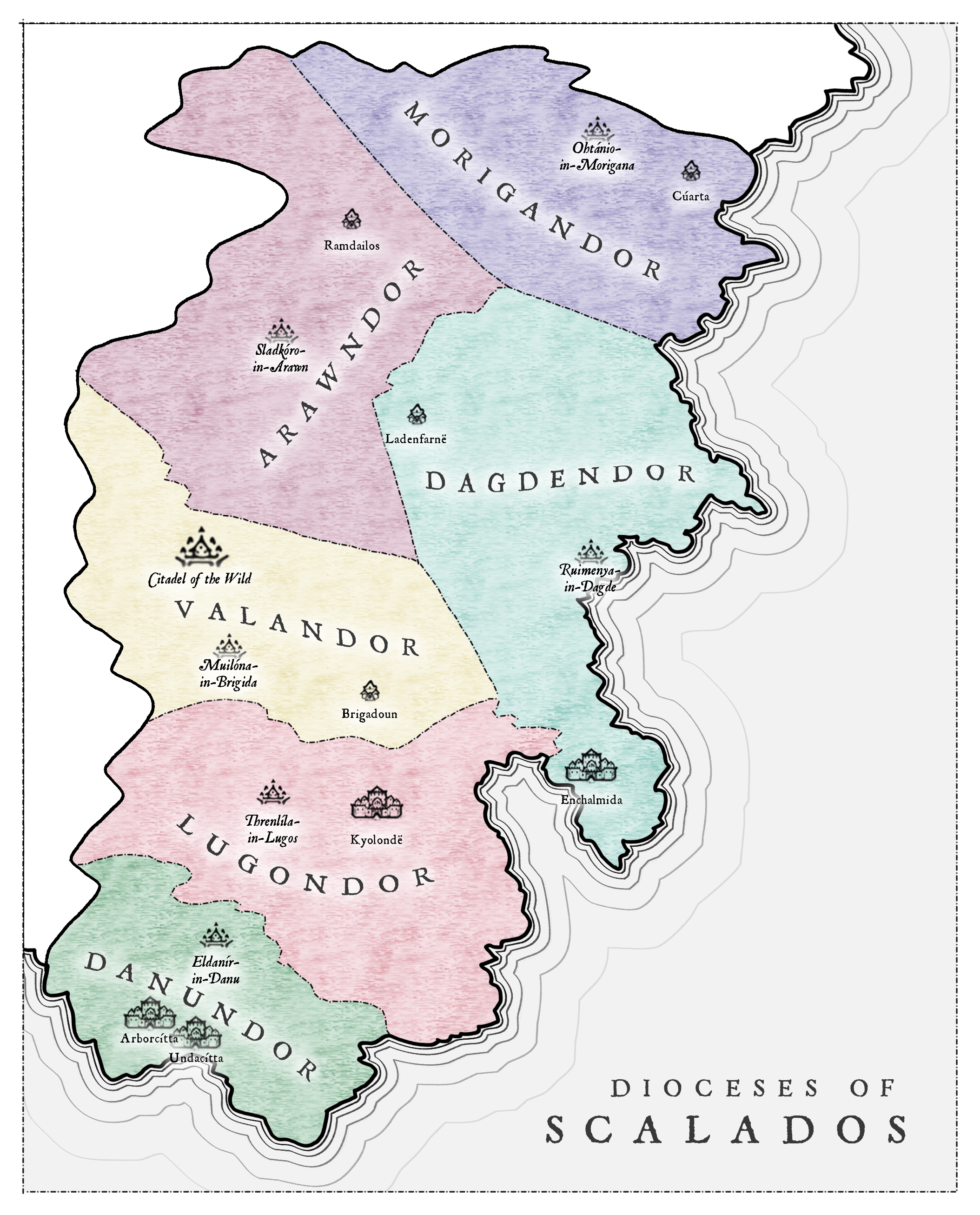Wild Dynasty
The Wild Dynasty is the third family of gods, after the Titans and the Pioneer Dynasty. They ruled the Age of Anxiety (see Ages of History), and govern the forces of the world beyond mortals' control. Worship of the Wild Gods is primarily centered within Scalados and the larger Wood Elf diaspora. It is also common among Druid circles.
Pantheon
The six main gods of the Wild Dynasty are: Danu (also known as Mother Danu, the Mother, or the Wildmother), goddess of nature and balance between all living things. Neutral Good. Dagda (also known as Father Dagda), Danu's husband, god of hearth and field. Neutral Good. Arawn (also known as the Hunter), Danu's brother, god of death and the hunt. Lawful Evil.* Morigana (also known as the Enchantress), Dagda's sister, goddess of magic, secrets, and shadows. Chaotic Evil.* Brigid, eldest daughter of Danu and Dagda, goddess of healing, crafting, and learning. Lawful Neutral. Lugos, eldest son of Danu and Dagda, god of love, passion, and war. Chaotic Neutral. *Note that Arawn and Morigana skew more towards lawful and chaotic (respectively) than towards evil. Though they tend more towards harshness and even cruelty than the other Wild Gods, followers of the Wild Dynasty largely see them as necessary forces in the balance of the world, much as predators are necessary to the balance of an ecosystem.Philosophy
The six main gods are typically associated with the seasons as follows: Lugos of Spring: love, creation, passion. A bursting-forth of floodwaters, a blossoming; the greater the tempest, the louder its summons towards the next generation. The Elvish element of gwyar. Brigid of Summer: growth, enlightenment, beauty, etc. The fire of learning stokes the forge of the craftsman and the soft light of the healer alike; the brightest sunlight illuminates the darkest of truths. The Elvish element of nwyfre. Arawn of Autumn: culling, diminishing, harvesting, etc. The hunter takes the old and weak from the pack; the farmer scythes the field, and separates the wheat from the chaff. The Elvish element of calas. Morigana of Winter: pause, reflection, preservation, etc. Life lies dormant and the elements are still; while all is suspended, each crystal's minute complexities are worth pondering. The Elvish element of gwyar. Dagda of All Seasons: optimism, adaptability, resourcefulness, etc. Each season grants a new gift for us to collect; all contribute in their own way to the rhythm of life. The Elvish element of nwyfre. Danu of No Season: harmony, steadfastness, acceptance, etc. Do not fret about the small fluctuations as the stars journey through the sky; the only constant in this world is that it will change and change again. The Elvish element of calas.Temples and Organizations
The worship and education of the clergy of the Wild Dynasty mainly occurs at six temple-campuses in relatively isolated areas. Each of these reigns over a diocese, an area of Scalados within which all clergy report officially to one of these temple-campuses. All six are, in turn, governed by the Citadel of the Wild. Nuns, scribes, clerics, and monks reside here, as do young students training to be monks and clerics. As their typical course of study lasts 50 years, the vast majority of these students are elves.Eldanír-in-Danu
Though Eldanír-in-Danu is the closest temple to the largest urban area in Scalados (the Sister Cities of Arborcítta and Undacítta), it is perhaps the most closed and isolated temple-campus.Muilóna-in-Brigida
This is the only temple-campus that offers an official course of study for young scribes. It contains the largest library in Scalados, as well as a smithy with several masters in the art of Elven Swordmaking.Ohtanio-in-Morigana
Cold and isolated, this temple is nearly always surrounded by fog. The trek to and from it is long and perilous; its warriors tend to be exceptionally strong because of this.Ruimenya-in-Dagde
Ruimenya boasts some of the finest produce in Scalados, especially from its legendary orchards and vineyards. It is frequently open to nearby residents for feast days, including some secular holidays such as Snowfall's Eve.Sladkóro-in-Arawn
This temple is carved into the mountainside at a near-vertical angle, with many dangerous staircases and ledges. Guests from outside the temple are welcome, but visitors are rare even on feast days because of the difficult terrain.Threnlíla-in-Lugos
Threnlíla is notable for being the only temple-campus that openly allows romantic relationships and even marriages between its clergy. In Y504, the Prima of this temple gave birth to three Aasimar triplets, two of whom are now Primas at the temple-campuses of Eldanír and Ohtánio.Valòmar
The Valòmar is the highly influential head priest of the organized worship of the Wild Gods. Elections for the Valòmar require a quorum of at least nine votes. The Lebemnë, or Circle of Five (supporting clergy at the Citadel of the Wild), receive one vote each, and the heads of each temple-campus receive two votes each.
Type
Religious, Pantheon
Leader Title
Subsidiary Organizations
Permeated Organizations
Related Traditions
Controlled Territories
Related Items
Related Ethnicities
Related Myths



Comments